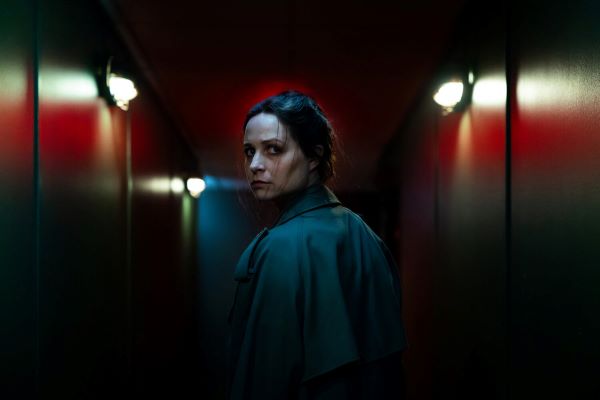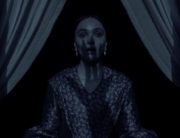
In the mid-1980’s in Great Britain, when Margaret Thatcher was at her most powerful, there was a crackdown on horror films featuring extreme acts and gore. They were considered “video nasties” and were either expected to be trimmed down to meet particular guidelines or they were banned completely.
In co-writer/director Prano Bailey-Bond’s impressive debut, Enid (Niamh Algar) is part of a team tasked to censor the above-mentioned material. She takes her job seriously, feeling she is protecting the public. With her hair tightly pulled back in a bun and speaking in a very clipped manner, she appears as the epitome of proper Britishness. She displays no emotion as she runs through these very disturbing films (which Bailey-Bond is clearly having a blast re-creating). She is precise and professional with her co-workers, and she seems to have no semblance of a social life inside or outside of her job.
We gain some clues as to what’s going on with her as her parents decide to declare her sister, who has been missing for years, legally dead. Enid was very young at the time of the vanishing and has no real memory of what happened. It is clear that whatever did occurred created some trauma that has stayed with Enid as she has since been periodically obsessed with finding her sister. Shortly after her parents’ decision, a man is arrested for eating the face of his wife (this is a horror film after all), claiming to be inspired by a movie that Enid had allowed to be released. Now she is getting angry phone calls at her home and a crowd of reporters are parked outside her workplace. Finally, a film assigned to her to censor rattles her because an actress in it looks, in her mind, just like her sister if she had grown up. It also triggers some long-buried memories.
These events push Enid into action, and she starts investigating the film, Don’t Go in the Church. This section of Censor plays like a mystery as Enid, by pretending to be an actress on a film shoot, plunges into the underworld of illicit video selling and making. The deeper she gets, the less she is able to distinguish fantasy from reality. It all ends in, well, lots of blood and gore.
Bailey-Bond makes a pungent statement about censorship and how much moralists focus on it rather than the real-world violence that occurs around them, but she also takes on the inherent sexism and voyeurism in many horror films, particularly the slasher types. And this is just the candy wrapping around the sour center of Censor, which is also about is how trauma warps and overtakes one’s worldview. Enid is so completely engrossed by the mystery of her sister’s disappearance that she cannot distinguish when real-life events deviate from her imagination. It alienates her from the people around her and also leads to a body count.
Prano Bailey-Bond has made a smart, entertaining, thought-provoking film that in the grand tradition of Cronenberg, Romero, and French director Julia Ducournau (Raw) does not skimp on the horror and, yes, the gore that die-hard horror fans crave.
















Leave A Comment